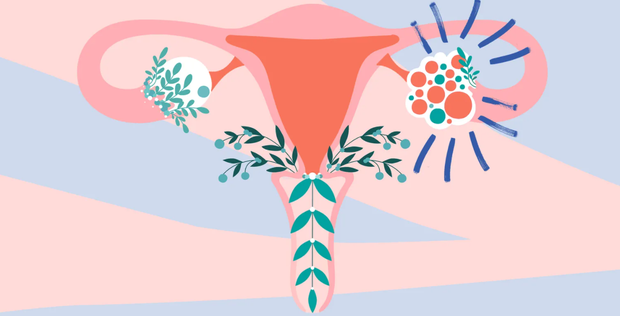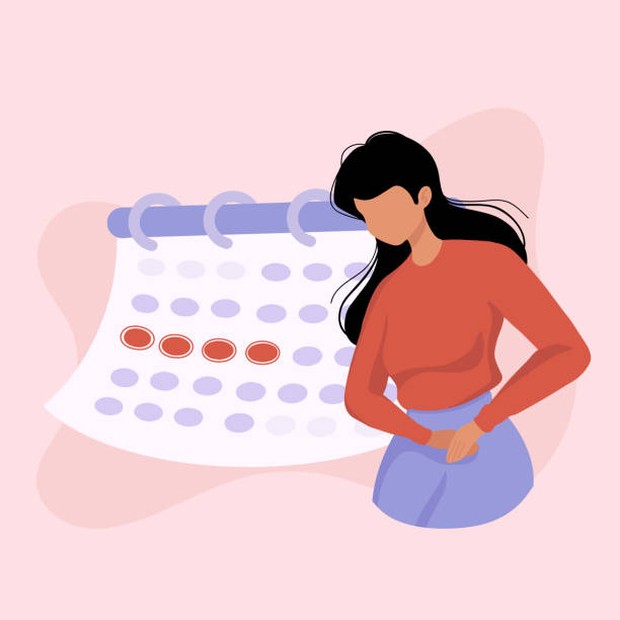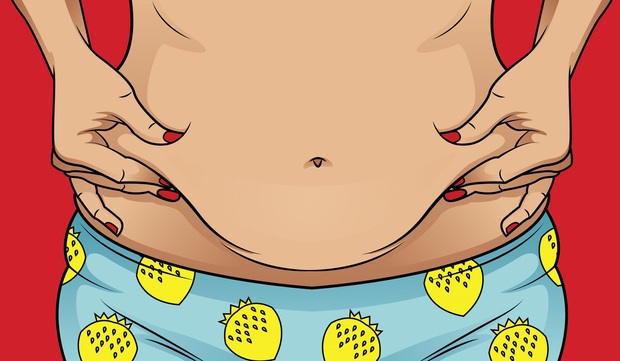Polycystic ovary and what you need to know
When she sees that her menstrual cycle is irregular, she has unintentional weight gain, what do girls usually think? Surely, it will be immediately attributed to the unscientific, unscientific diet and sleep.
I think that’s true, but it’s not enough. Many times, menstrual irregularities and weight gain are one of the warning signs of polycystic ovary disease that women do not pay attention to.
What is polycystic ovary?
Polycystic Ovary Syndrome (PCOS) is a common hormonal disorder in women of reproductive age (18-35 years old).
The disease forms when the level of Androgen (male hormone) is abnormally high in the female body, disrupting the development of ovarian follicles, creating conditions for many small follicles to appear in the ovaries.

Healthy Ovaries (left) – Polycystic Ovaries (right)
Experts believe that polycystic ovary disease can originate from two main factors: heredity and insulin resistance (also known as excess insulin – the hormone that stimulates the production of male hormone Androgen in the female body). . In addition, a diet that provides too much starch can also be an indirect cause of polycystic ovary syndrome.
Warning signs of polycystic ovary
1. Irregular menstruation
Up to 50% of women with PCOS experience irregular periods, of which about 20% are completely absent. In the early stages of the disease, menstrual cycle changes often have signs such as: abnormally long menstrual periods (more than 35 days), excessive or too little menstrual blood, bleeding between periods, .. .

Actively monitoring the cycle as well as the status of menstrual blood and the number of days of menstrual bleeding is very important to help girls recognize abnormal signs early.
2. The body grows a lot of black and thick hair
Statistics show that about 20-43% of patients diagnosed with polycystic ovary syndrome have signs such as a thick mustache, hairs in the chest area, around the navel. On clinical examination, approximately 54% were assessed as hirsutism.
In women with PCOS, testosterone and androgen levels are elevated, which alters the physiological manifestations of the skin. The most common sign of this condition is hirsutism, hair growing in many places on the body such as arms, legs, chest, abdomen, back, thighs, …

Excessive hair growth is also a warning sign of polycystic ovaries
3. Acne grows a lot, chit chit
The activity of the skin is greatly influenced by the body’s hormones, so the skin of people with PCOS is often prone to acne. Acne grows back, it is very difficult to treat definitively by applying and applying methods.
The cause of this problem lies in the process of increasing the androgen hormone, which makes the sebaceous glands more active, easy to make the skin oily, clogged pores and acne. The facial skin is often the most severely affected, followed by the chest skin, back skin, etc.
More severe, the skin under the neck, arms, chest or thighs also appear red, black or light brown patches.

Acne is also a warning sign of polycystic ovaries
4. Unexplained weight gain
Weight gain is one of the obsessions for women and there are many causes for this. However, if you eat right, exercise hard and still gain weight out of control, this could be a warning sign that you have polycystic ovary syndrome.
When androgen hormone levels are high, excess fat easily accumulates around the waist, causing your body to gain weight abnormally. Even the abdomen and hips can accumulate fat.

Do not belittle if the second round naturally increases fat!
What are the consequences of polycystic ovaries?
According to experts, doctors, higher-than-normal Androgen levels in people with PCOS will affect fertility and many other health aspects. Specifically:
1. Difficult to conceive, easy to miscarry
With polycystic ovary syndrome, the ovaries have many follicles, but no eggs are released. Therefore, the sperm cannot fertilize the egg.
People in the early stages of polycystic ovaries, when the follicles are small, can still ovulate and become pregnant. However, the risk of miscarriage will be higher than normal because insulin and male hormone levels in the body are high, threatening the development of the fetus.

2. Endometrial cancer
After about 14 days of ovulation, the lining of the uterus will shed. Eggs do not ovulate regularly every month due to polycystic ovaries, causing this lining to not shed and thicken, increasing the risk of endometrial cancer.
3. Negative effects on mental health
As mentioned above, polycystic ovaries can cause weight gain, acne, … creating a negative impact on a girl’s confidence.
And yet, the disruption of female hormones also makes it difficult for women to maintain a happy and positive mood. If you already have a mental illness, polycystic ovary syndrome can contribute to poor mental health.
Prestigious addresses for polycystic ovarian examination
In case you want to examine and screen for symptoms of polycystic ovaries, you can go to Central Hospitals such as: National Hospital of Obstetrics and Gynecology, Tu Du Hospital, … or clinics/ Private hospitals such as Tam Anh Hospital, Vinmec Hospital, Viet Phap Hospital, Thu Cuc General Clinic, Hong Ngoc General Clinic,…
Diagnosis and treatment will depend on the stage of development of the cysts in the ovaries. If detected early, the doctor can prescribe oral medication as well as suggest diet/exercise. If the cysts are large, laparoscopic ovarian surgery may be needed to remove them.
Prevention is always better than cure. That’s why, girls, don’t forget to go for a general health check-up every 6 months for early detection and timely treatment if you’re unlucky!
at Blogtuan.info – Source: Kenh14.Vn – Read the original article here




